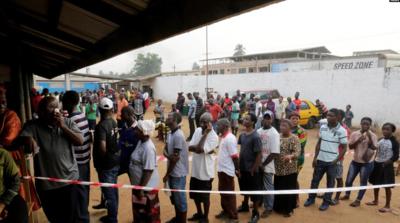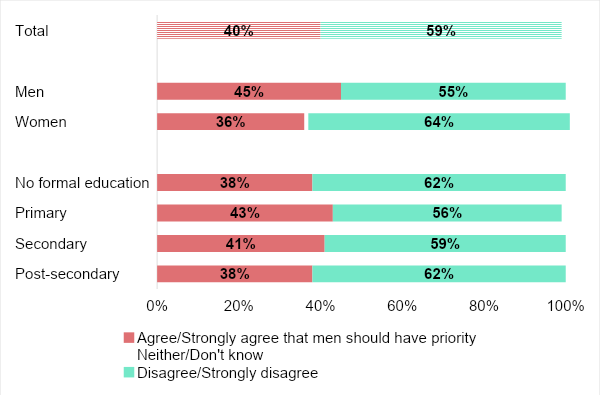Liberia: Survey Shows Liberians Strongly Endorse Women Leadership

Flashback: People wait to vote during the presidential election at a polling station in Monrovia, Liberia, Dec. 26, 2017.
--- According to Afrobarometer, more than three-quarters of Liberians say women should have the same chance as men of being elected to public office.
A large majority of Liberians believe that women should have the same chance of being elected to public office as men, the latest Afrobarometer survey shows.
While many survey respondents think that women will gain standing in the community if they run for elective office, the poll also indicates that women could be criticised or harassed if they do so.
Liberia became the first African country to elect a woman as head of state in 2006, when Ellen Johnson Sirleaf became president.
But women’s representation in public life remains low, according to the United Nations Development Programme (UNDP). The country’s general elections in October will include female candidates in parliamentary races but not in the presidential contest.
Survey responses also show that a majority of Liberians support gender equality in hiring and that most citizens want their government and elected officials to do more to advance the rights and equality of women.
According to Afrobarometer, more than three-quarters of Liberians say women should have the same chance as men of being elected to public office, while more than eight in 10 respondents think women will gain standing in the community if they run for office.
“But two-thirds (65%) consider it likely that others in the community will criticise or harass them, and more than half (54%) think they will probably face problems with their families,” the survey shows.
“Four in 10 Liberians (40%) say that men should be given priority over women in hiring when jobs are scarce, while 59% reject this form of gender discrimination,” it added.
The Afrobarometer survey report comes weeks after the National Elections Commission (NEC) signed a 30% gender quota MOU with political parties to increase the slot of female candidates for the October 10 polls.
The agreement, which voluntarily enforced Section 4.5 of the country’s elections law, would require political parties and coalitions to submit a “candidates listing” that contains a minimum of 30 percent female representation.
The MOU came a few months after President George Weah voted a progressive amendment to Section 4.5 of the election law, which sought to make the 30% gender representation mandatory. The law would have empowered the electoral body to fine or delist any political parties that failed to adhere to the gender quotas.
But now, the NEC is dependent on the willingness of political parties and coalitions to uphold Section 4.5 of the law, which called on them to “endeavour” and ensure that their candidates roster consists of no fewer than 30 percent representatives from each gender.
Women vying for political seats in Liberia face huge challenges, including entrenched traditional norms, cultural practices, limited education, which have hindered gender equality in politics. The country is currently ranked 162 out of 185 on the Inter-parliamentary Union’s list of women in national parliaments with women occupying less than 11 percent of the 103 seats in the Legislature despite constituting more than 50 percent of the population.
The percentage of women has also fallen since 2006 — a trend that correlates to a decrease as male candidates are often preferred over female candidates.
The 2017 presidential election is a case in point, with none of the 20 candidates being women. Additionally, only 10% of the candidates for the House of Representatives were women, further highlighting the need for action to address gender disparity in Liberian politics.
Meanwhile, the Afrobarometer survey also shows that two-thirds of Liberians say the government should do more to promote equal rights and opportunities for women.
Men trail women (55% vs. 64%) in insisting on gender equality when it comes to jobs, while citizens with post-secondary education and those with no formal schooling are equally likely to support equality in hiring, the survey added.
Afrobarometer is a pan-African, non-partisan survey research network that provides reliable data on African experiences and evaluations of democracy, governance, and quality of life.
———————
Other Images/Charts for the story 👇🏾

PHOTO: Should women have an equal chance to be elected? Afrobarometer survey shows ‘yes’ across various demographics.
Figure 2: How running for elective office might affect women's lives | Liberia | 2022
Respondents were asked: If a woman in your community runs for elected office, how likely or unlikely is it that the following things might occur: She and her family will gain standing in the community? She will be criticised, called names, or harassed by others in the community? She will face problems with her family?
Figure 3: Should men have priority for scarce jobs? | by gender and education level | Liberia | 2022

Respondents were asked: For each of the following statements, please tell me whether you disagree or agree: When jobs are scarce, men should have more rights to a job than women.
Figure 4: Should government do more or less to promote equal rights? | by gender | Liberia | 2022
Respondents were asked: In your opinion, should government and elected officials be doing more than they are doing now to advance the rights and equality of women, or should they be doing less, or are they doing about the right amount?
